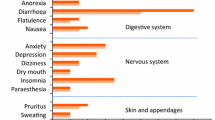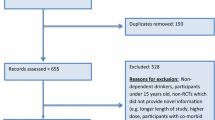Abstract
Objective: To compare two anticraving drugs, acamprosate and naltrexone, for effectiveness, kinetics and tolerability in patients with abusing or dependent on alcohol.
Design: This study reviewed all published double-blind, placebo-controlled trials of patients abusing or dependent on alcohol. Main clinical outcome measures were: time to relapse, cumulative relapse rate, total number of drinks during study period.
Setting: Mainly ambulant cases.
Patients: Patients consisted of 3338 acamprosate and more than 200 naltrexone cases.
Interventions: Some studies also used psychosocial support, one combined acamprosate with disulfiram.
Results: Both drugs were superior to placebo. Drop-out rates were comparable between drugs. Naltrexone caused more adverse effects than acamprosate. Acamprosate has been studied for over 1 year and has been shown to remain effective with carry-over of the effect after stopping the medication for at least 1 year; naltrexone has been studied for 3 months, with no carry-over.
Conclusion: Both drugs were effective, but acamprosate may be preferred above naltrexone because of its proven long-term effectiveness with carry-over.
Similar content being viewed by others
References
O’Connor PG, Schottenfeld RS. Patients with alcohol problems. N Engl J Med 1998; 338: 592–602
Wilde MI, Wagstaff AJ. Acamprosate. A review of its pharmacology and clinical potential in the management of alcohol dependence after detoxification. Drugs 1997; 53: 1038–53
Volpicelli JR, Alterman AI, Hayashida M, et al. Naltrexone in the treatment of alcohol dependence. Arch Gen Psychiatry 1992; 49: 867–80
O’Malley S, Jaffe AJ, Chang G, et al. Naltrexone and coping skills therapy for alcohol dependence, a controlled study. Arch Gen Psychiatry 1992; 49: 880–7
O’Malley SS, Croop RS, Wroblewski JM, et al. Naltrexone in the treatment of alcohol dependence: a combined analysis of two trials. Psychiatry Ann 1995; 25: 681–8
Chick J. UK multicentre study of naltrexone as adjunctive therapy in the treatment of alcoholism: efficacy results. Proceedings X Congress World Psychiatric Association; 1996 August; Madrid: WPA, S–1112–3
Balldin J, Berglund M, Borg S, et al. A randomized 6 months double-blind placebo controlled study of naltrexone and coping skills educational programme. Alcohol Alcohol 1997; 32: 325
Acamproasate for alcohol dependence? Drugs Ther Bull 1997; 35: 70-2
Berg BJ, Pettinati HM, Volpicelli JR. A risk-benefit assessment of naltrexone in the treatment of alcohol dependence. Drug Saf 1996; 15: 274–82
Herz A. Endogenous opioid systems and alcohol addiction. Psychopharmacology 1997; 129: 99–111
Littleton J. Acamprosate in alcohol dependence: how does it work. Addiction 1995; 90: 1179–88
Zernig G, Fabisch H. Pharmacotherapy of alcohol dependence. Trends Pharmacol sci 1997; 18: 229–31
Schuckitt MA. Recent developments in the pharmacotherapy of alcohol dependence. J Consult Clin Psychol 1996; 64: 669–76
Wilde MI, Goa KL. Management of alcohol dependence after detoxification. The potential role of acamprosate. Dis Manag Health Outcomes 1998; 3: 35–46
Volpicelli JR, Volpicelli LA, O’Brien ChP. Medical management of alcohol dependence: clinical use and limitations of naltrexone treatment. Alcohol Alcohol 1995; 30: 789–98
Weinrieb RM, O’Brien ChP. Naltrexone in the treatment of alcoholism. Ann Rev Med 1997; 48: 477–87
O’Malley SS, Jaffe AJ, Chang G, et al. Six-month follow-up of naltrexone and psychotherapy for alcohol dependence. Arch Gen Psychiatry 1996; 53: 217–24
Saitz R, O’Malley SS. Pharmacotherapies for alcohol abuse. Psychiatr Clin North Am 1997; 81: 881–907
Morgan M. UK multicentre study of naltrexone as adjunctive therapy in the treatment of alcoholism: safety results. Proceedings X Congress World Psychiatric Association; 1996 August; Madrid: WPA, S–1112–4
Croop R. Long-term safety of naltrexone for the treatment of alcoholism. Proceedings X Congress World Psychiatric Association; 1996 August; Madrid: WPA, S–1112–5
King AC, Volpicelli JR, Gunduz M, et al. Naltrexone biotransformation and incidence of subjective side effects: a preliminary study. Alcohol Clin Exp Res 1997; 5: 906–9
Croop RS, Faulkner EB, Labriola DF. The safety profile of naltrexone in the treatment of alcoholism. Arch Gen Psychiatry 1997; 54: 1130–5
Sandwijk JP, Cohen PDA, Musterd S. Licit and illicit drug use in Amsterdam. Report of a household survey in 1990 on the prevalence of drug use among the population of 12 years and over. Amsterdam: Inst Soc Geograf UvA, 1991
Freed PE, York LN. Naltrexone: a controversial therapy for alcohol dependence. J Psychosoc Nurs 1997; 35(7): 24–8
Bills LJ, Kreisler K. Treatment of flashbacks with naltrexone. Am J Psychiatry 1993; 150: 1430
Lerner AG, Oyffe I, Isaacs G, et al. Naltrexone treatment of hallucinogen persisting perception disorder. Am J Psychiatry 1997; 154: 437
Roth AS, Ostroff RB, Hoffman RE. Naltrexone as a treatment for repetitive self-injurious behavior: an open-label trial. J Clin Psychiatry 1996; 57: 233–7
van den Brink W. Epidemiologie en classificatie van alcoholproblemen. In: Geerlings PJ, van den Brink W, Schippers GM, editors. Behandelstrategieën bij alcoholproblemen. Houten: Bohn Stafleu Van Loghum, 1996: 1–10
Author information
Authors and Affiliations
Rights and permissions
About this article
Cite this article
Hoes, M.J.A.J.M. Relapse Prevention in Alcoholics. Clin. Drug Investig. 17, 211–216 (1999). https://doi.org/10.2165/00044011-199917030-00005
Published:
Issue Date:
DOI: https://doi.org/10.2165/00044011-199917030-00005




